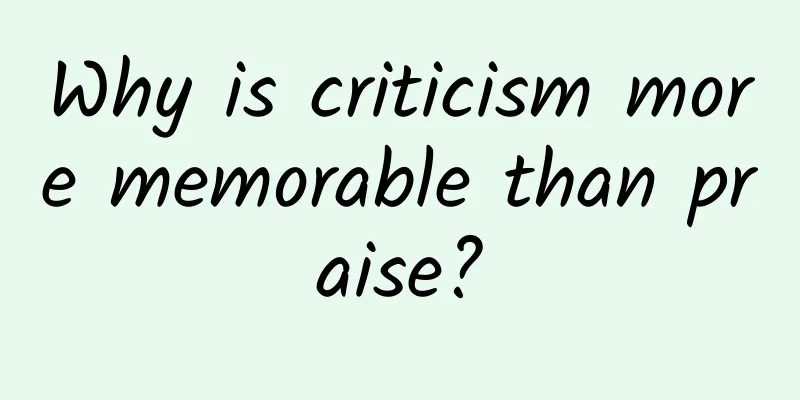Why is criticism more memorable than praise?

|
© Frederic Cirou/Getty Images Leviathan Press: Regarding "negative bias", I think there are two types that can be treated differently. One type is malicious slander and abuse, which can be completely ignored. The other type is critical opinions based on rational analysis. This type will actually be a good opportunity for you to further reflect on your own opinions: this may update your views, eliminate old thinking frameworks, and thus construct a new perspective. Of course, there is a lot of negative extreme emotions in daily life, especially on the Internet. It would be more accurate to say that they are irrational noise rather than criticism. As children, we were often told that "sticks and stones may break bones, but words never hurt." However, as adults, we've learned that this old adage couldn't be more wrong—while a physical injury may take weeks to heal, a negative comment can scar us for a lifetime. Whether it's a calm critique from a teacher at school or a cruel remark hurled during a heated argument with a friend or loved one, we tend to remember criticism much more vividly than positive comments, thanks to a phenomenon called negativity bias. (www.ncbi.nlm.nih.gov/pmc/articles/PMC3652533/) In fact, many complex effects can be explained by this bias, a general tendency for negative emotions to affect us more strongly than positive ones. Roy Baumeister, a social psychologist at the University of Queensland and co-author of The Power of Bad: And How to Overcome It, says the bias causes us to pay extra attention to threats and exaggerate dangers. While focusing on the dark side of the world around us sounds bleak, it has helped humanity overcome everything from natural disasters to plagues and wars by making people better prepared to deal with them (although there’s evidence that optimism can also help protect us from the stress of extreme situations). The human brain evolved to protect our bodies and keep us alive, and it has three early warning systems for dealing with emerging dangers. The ancient basal ganglia system controls our fight or flight response, the limbic system triggers emotions in response to threats to help us understand danger, and the more modern prefrontal cortex allows us to think logically in the face of threats. (www.ncbi.nlm.nih.gov/pmc/articles/PMC5940768/) (www.ncbi.nlm.nih.gov/pmc/articles/PMC3543080/) (www.nature.com/articles/35036228) "In our ancestors, those with that (negative) bias were more likely to survive," Baumeister says. Humans are hardwired to seek out threats, and babies as young as eight months old will look more eagerly at a picture of a snake than a friendlier frog. By age five, they have learned to give more weight to angry or fearful faces over happy ones. (pubmed.ncbi.nlm.nih.gov/20121878/) (pubmed.ncbi.nlm.nih.gov/19143803/) Baumeister says that noticing a problem in its infancy can be a good strategy. “You want to eliminate the negative first and fix the problem. Essentially, you want to cut your losses first.” But while focusing on the negative may keep us safe in extreme situations, negativity bias may not help us in everyday life. Baumeister believes that unless we learn to overcome the overpowering effect that negativity has on us, it will continue to distort our view of the world and how we respond to it. Personal attacks and negative comments stick with us more than positive feedback. © The Cybersmile Foundation For example, the world in newspapers often seems depressing. Journalists are often accused of chasing bad news simply because it sells more newspapers and draws in more readers. While that may be true to a certain extent, researchers have shown that readers are naturally drawn to stories of disaster and are more likely to share them with others. Rumors about potential dangers—even if they don’t sound true—spread through a population much faster than rumors about the possibility of good things happening. (www.sciencedirect.com/science/article/abs/pii/S1090513816301660) (www.sciencedirect.com/science/article/abs/pii/S1090513817301976) In one study, scientists at McGill University in Canada used eye-tracking technology to study which news articles volunteers paid the most attention to. They found that people tended to choose stories about corruption, frustration, hypocrisy and other bad news over positive or neutral stories. People who were more interested in current events and politics were particularly likely to choose negative news, yet when asked, these same people said they preferred good news. (www.cpsa-acsp.ca/papers-2013/Trussler-Soroka.pdf) © CNBC What we read and see on the news can fuel our fears. For example, Baumeister explains in his book that our fear of terrorism is extremely high, even though fewer people have been killed by terrorist groups in the United States over the past 20 years than have died in their bathtubs over the same period. (www.tandfonline.com/doi/abs/10.1080/09546553.2018.1530662) Worrying about a hypothetical, dire situation can make us feel terrified, yet just one small negative experience can disproportionately affect our entire day. Randy Larsen, a professor of psychological and brain sciences at Washington University in St. Louis, reviewed evidence that negative emotions last longer than happy ones. He found that we tend to spend more time thinking about bad things than good ones, which may help explain why embarrassing moments or criticism from others can linger in our minds for years. (psycnet.apa.org/record/2010-23922-005) It’s hard not to take hurtful comments from loved ones, family members, or friends seriously. “I think negative comments from people we love and trust have a much greater impact than negative comments from strangers,” Baumeister says. This is partly because we have certain expectations of how our friends and family should treat us. © The Nigerian Voice In some cases, negative comments from loved ones can cause long-term trauma and resentment that can tear a relationship apart. Researchers at the University of Kentucky found that when partners ignore problems in a relationship in order to maintain "passive fidelity," the relationship is rarely saved. "What determines whether a relationship is successful is not so much the good and constructive things that partners do or don't do for each other, but the destructive things that partners do or don't do in the face of problems," they said. (www.sciencedirect.com/science/article/pii/S266732152200035X) (www.tandfonline.com/doi/abs/10.1080/01463373.2014.890118) Another study that followed couples for more than ten years showed that the intensity of negative emotions expressed by couples toward each other in the first two years of marriage predicted whether they would later go their separate ways, with couples who ended in divorce expressing stronger negative emotions in the first two years of marriage. (psycnet.apa.org/record/2001-16163-005) The negativity bias explains why many of us take a relationship for granted when it’s going well, but are quick to notice imperfections and even turn small issues into big problems. Criticism is amplified when it comes in large numbers, making social media a potential negative echo chamber. Despite having the best-selling album of 2019, Billie Eilish told BBC Breakfast that she tries not to read reviews. "It's ruined my life," she said. "The cooler what you do, the more people hate you. It's crazy. It's worse than it's ever been." Pop singer Dua Lipa and former Girls Aloud member Nicola Roberts have also spoken out about the impact of online trolls. Baumeister warns that we are ill-equipped to handle negativity on social media because our brains evolved to listen to the warnings of a close-knit group of hunter-gatherers, not to deal with the admonitions of hundreds or thousands of strangers. “Hearing negativity from a large group of people is therefore bound to be devastating,” he says. © Luci Gutiérrez Of course, the impact of being trolled online or criticized by friends will vary from person to person. But Lucia Macchia, a behavioral scientist and visiting fellow at the London School of Economics, says that accepting, internalizing and reinforcing any negative comments can increase stress, anxiety, frustration and worry. “Dealing with these negative emotions has a big impact on our bodies, as they can even generate and exacerbate physical pain,” she adds. Many studies have shown that as we age, we tend to focus on the positive. Scientists call this effect the "positivity bias," and they believe that we begin to remember positive details more than we focus on negative information in middle age. Baumeister believes this is because we need to learn from failures and criticism when we are young, but this need decreases as we age. (www.ncbi.nlm.nih.gov/pmc/articles/PMC6186441/) Another helpful strategy might be to think of it this way: a review has more to do with the person making the review than it does with the person receiving the review. —Lucia Macchia However, negative comments can be hurtful at any age, but especially when we are particularly vulnerable or weak. “When you are at a low point, it is already hard to bounce back, so it can be particularly hard to deal with negative comments at this time,” Baumeister said. Whether people with certain personalities are more prone to negative emotions than others is a hotly debated topic, Macchia said, but a recent study found no "consistent evidence" of a link between a person's personality traits or political ideology and negativity bias. “We are all sensitive to negative comments because there is no such thing as a ‘tougher’ personality trait. Thinking that ‘everyone gets negative comments’ can help us cope with them…and this can be a good strategy to protect our own mental health,” she said, adding, “Another helpful strategy might be to think that comments are more about the person making the comment than the person receiving it.” © Global Press Journal By recognizing our negativity bias, we can overcome its negative effects and even harness its benefits. For example, Shelley Taylor, a professor of social psychology at the University of California, Los Angeles, has shown that women with breast cancer sometimes develop unrealistically optimistic beliefs to help them cope with their condition. These “positive fantasies” have been positively associated with both mental and physical health, suggesting that they can help us prioritize mind over matter when we need to. (psycnet.apa.org/record/1988-16903-001) Taylor’s research also illuminates a common response to negative emotions: minimization, our ability to “suppress, minimize, or even eliminate the impact of an event.” In Taylor’s research, for example, cancer patients sometimes compared themselves to women who were sicker, making their own problems seem smaller. You might not think of professional adventurer and skydiver Felix Baumgartner as someone who would need to use minimization techniques to face his fears. However, Michael Gervais, a psychologist who works with Olympians, used these techniques to help Baumgartner achieve his goal of becoming the first supersonic skydiver. In an interview, Gervais said Baumgartner was concerned about being trapped in the suit. Gervais taught him not to view it negatively as a potential prison, but to imagine the suit turning him into a superhero, thereby magnifying the upside and minimizing the downside. By combining breathing techniques and cognitive behavioral therapy (CBT), Baumgartner was able to improve his endurance in the suit and achieve his goal of becoming "Fearless Felix." Felix Baumgartner used visualisation techniques to help him overcome negative thoughts during his record-breaking skydive. © Red Bull/Abaca Press/Alamy Few of us will have ambitions as lofty as Baumgartner’s, but we can all learn from him. By overcoming the negatives and emphasizing the positives, we may have a better chance of achieving our dreams. By Sarah Griffiths Translated by Kushan Proofreading/Open Sesame Original article/www.bbc.com/future/article/20220624-why-criticism-lasts-longer-than-praise This article is based on the Creative Commons License (BY-NC) and is published by Kushan on Leviathan The article only reflects the author's views and does not necessarily represent the position of Leviathan |
<<: How high should the air conditioner be set?
>>: Genes from bacteria can actually affect courtship?
Recommend
How to set keywords for Baidu bidding promotion? Can I add multiple identical keywords?
In some specific cases, you may need to add multi...
Can a cup of coffee a day cause anemia? Nutritionists reveal the truth!
In recent years, more and more people have begun ...
Summary of APP promotion terms, you may only know 10%
Every industry has its own professional terminolo...
The first principle of Internet financial operations: resources are scarce and users are rational.
The two basic assumptions for the first principle...
What do girls use to solve physiological problems?
Whose cat doesn’t go into heat, and whose girl do...
Kuaishou Operation Guide: How to operate and promote vertical accounts on Kuaishou
01Settlement and Binding 1. You can register a Ku...
Stop being emo! Beware of thyroid disease
Recently, #women with depression are more likely ...
Why can a ping-pong ball go into space but not be taken on an airplane?
A few days ago, Chinese astronauts in orbit actua...
Be careful of such chicken feet, as eating them has a great impact on human health!
Do you have any doubts when buying instant chicke...
[Popular Science of Chinese Military Technology] How does armor perspective technology allow tank soldiers to use "hacks"?
With the progress of the times, the wide area and...
How to bring about conversions by building an operation system and channel diversion?
1. What is operation in your mind? The operation ...
Meituan responded to the cancellation of Alipay. Why did Meituan cancel Alipay again?
Meituan responds to cancellation of Alipay July 3...
Introduction to the advantages of 360 Shangyi advertising and promotion!
360 Business Shangyi: Data mining and analysis ba...
It's time to defend the potato! We've been so misunderstood about it...
Compiled by: Gong Zixin Potatoes are high in star...









